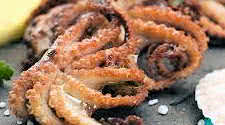The Many Benefits from Nutrients of Food from the Sea for Athletes

There are many types of foods to use in your daily meals
The typical bodybuilder's diet favors land-based foods, some of which can be very high in fat and have deleterious effects on your health and physique if consumed frequently and in massive amounts. If you base more of your diet on food from the sea, you can add some variety and choose from an abundance of healthy, nutrient-dense foods. You may be surprised at the benefits you can experience just by incorporating some of the ocean's bounty into your nutrition plan.
Fishy Facts on Fat
Interestingly, the fat in many types of fish provides a tremendous array of health benefits. My favorite fish, salmon, is known to have high levels of the heart-healthy omega-3 fatty acids. In addition, says Conrad Earnest, PhD, director of clinical research at Metabolic Response Modifiers in Long Beach, California, "Omega-3s seem to improve overall cell membrane fluidity; therefore they improve various effects such as anti-inflammation, reduction in blood lipids and even a possible reduction in bodyweight."In a controlled study done at the University of California at Berkeley, subjects confined to a nutrition suite For 100 days ate approximately 55% of their calories from carbohydrates, 15% from protein and 30% from fat. One group received 2.1% of its total caloric intake from salmon fat. The study's results showed that plasma triglycerides dropped and protective high-density-lipoprotein (HDL) levels rose with fish- fat consumption. So not only can you get high-quality protein from salmon but the fat is actually a fringe benefit! You can't say that about beef, pork or chicken. Other fish high in omega-3s include mackerel, herring, blue fin and albacore tuna and European sardines.
In a study of Norwegians who were given 20 ml of cod liver oil (remember, this stuff contains a lot of omega-3 fats) for three weeks, levels of the good cholesterol, HDL, increased significantly. Subjects who consumed this oil also showed a tendency for reduced thrombosis, which means their blood had a lesser tendency to clot. This may prevent the formation of a clot that might eventually block a blood vessel. If this happens in a coronary or heart vessel, you could have a heart attack In an even more intriguing study, people with musculoskeletal pain (for example, joint pain) experienced less pain if they consumed cod-liver oil. This suggests that cod-liver oil might have an anti-inflammatory effect that could he useful in expediting post workout recovery You know how your joints and muscles ache after an intense bout of lifting? Maybe cod-liver oil would help.
Of Shells & Sharks
By now you know how omega-3 fatty acids from cold-water fish can aid your quest for better health. But a few undersea oddities may also help. Chitosan, a substance derived from the shells of crustaceans, is known to have the ability to bind to lipids. Apparently, chitosan dissolves in the stomach and changes into a gelatin like mass that can then entrap some of the dietary fat in the intestine. Fat bound in this gelatinous matrix doesn't get absorbed!Chitosan has been shown to reduce blood cholesterol levels by 64% in mice. As reported in the American Journal of clinical Nutrition, "Proper supplementation of chitosan to the diet seemed to be effective in lowering plasma cholesterol." Of course, this doesn't mean you can eat all the fat you want and it won't show on your hips. You still need to eat smart.
Mother ocean-derived supplement that may contain some bite is shark cartilage, a source of chondroitan sulfate that purportedly has beneficial effects in some arthritis sufferers. Although controversial, some evidence indicates that shark cartilage might have potent analgesic and anti-inflammatory effects. In a study done at the Universidade Federal de Ceara in Brazil, extract from shark cartilage inhibited pain perception in rats. Work by Canadian scientists further confirms an anti-inflammatory and perhaps anticancer effect of shark-cartilage extract.
The anti-inflammatory effects of these various seafoods shouldn't be ignored by bodybuilders. Intense weight training usually produces skeletal muscle damage that involves a subsequent inflammatory response. (Some damage is good; too much isn't.) The use of these agents could enhance the recovery process. Quicker recovery means you can get back into the gym sooner and resume high-intensity training.
Wet & Wonderful Weeds
I know most of you think of seaweed as that frustrating plant you try to dodge while bodysurfing. Instead of avoiding it, though, maybe you should eat it. Brown seaweed, or laminaria, has been shown to contribute to low rates of breast cancer in Japanese women.' Researchers hypothesize that the anticancer anti health-enhancing effects of seaweed are related to a reduction in blond cholesterol, binding of pollutants and perhaps stimulation of the immune system.Then we've got the blue-green algae spirulina. A good source of protein before you get too excited, it isn't as good as whey, it was a favorite among the ancient Aztecs of Mexico. Spirulina is low in fat and high in fiber and is approximately 58% protein. You'd have to chow down a major amount, however, to get your protein for the day A better reason to eat spirulina is that it may enhance immune function and shows promise as an anti-inflammatory agent. Work by Cuban scientists shows that phycocyanin, a pigment found in this blue-green algae, has potent antioxidant and anti-inflammatory effects.
Other foods such as kelp and red marine algae have been touted as therapeutic superfoods on par with spirulina, though the scientific evidence to date is sparse. I wouldn't he surprised, however, if these foods offer many of the benefits that other seafoods provide. As long as you obtain seafood from clean bodies of water and don't overdo consumption of fish fats, you'll reel in many benefits without noticeable drawbacks.